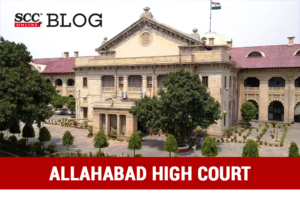Allahabad High Court: In two anticipatory bail applications filed by Dr. Rajendra Bihari Lal (Vice Chancellor) and Vinod Bihari Lal (Director) of Sam Higginbottom University of Agriculture, Technology and Sciences(‘SHUATS’), alleged for doing mass religious conversions Manju Rani Chauhan, J. rejected their anticipatory bail pleas.
The FIR was registered against the accused persons for offences under Sections 153-A, 506, 420, 467, 468, 471 of the Penal Code, 1860 and Sections 3 and 5(1) U.P. Prohibition of Unlawful Conversion of Religion Act, 2021 (‘U.P. Act No. 3 of 2021’)
It was alleged that about 90 persons of Hindu religion have been congregated at a Church of India for the purpose of their conversion to Christianity by putting them under undue influence, coercion and luring them by playing fraud and promise of easy money etc. On receiving this information, the Government officers reached the place and interrogated the pastor, he disclosed that the process for conversion was going on for the last 34 days and that this process shall be completed within 40 days and they have been trying to convert even the patients admitted to the Hospital.
The accused persons submitted that since the punishment, as provided under Section 5 of the Act, 2021, for contravention of Section 3 of the Act, 2021, attracts only one year imprisonment which may extend to five years; therefore, the offence does not fall under the category which may impinge on granting anticipatory bail.
The Court examined Section 438 and said that the though the offence under Section 5 of the Act, 2021 warrants only five-year imprisonment, however, the proviso to Section 5 also envisages that contravention in respect of mass conversion shall attract imprisonment for a term not less than three years but may extend to ten years.
It also said that not only the period of punishment, but the nature of offence which is to be taken into consideration as the same is affecting human body or society at large and that is what matters and has relevance, and as material evidence regarding mass conversion has been collected which affects society at large, thus the said offence is a serious offence and cannot be taken lightly.
Further, it said that the FIR in addition to Section 3 read with Section 5(1) of the Act, 2021 includes offences under Sections 153-A, 506, 420, 467, 468, 471 IPC for which the Magistrate did not issue remand at the initial stage, however, subsequently the remand has been accorded in the remaining sections also. Therefore, the averments in the FIR cannot be ignored when material evidence has been collected against the accused persons for offence affecting a large section of society which disturbs public order and the fact that the victims have also come forward to lodge FIR.
The Court reiterated that the object of arrest and detention of the accused is primarily to secure his appearance at the time of trial and to ensure that if he is found guilty, he is available to receive sentence.
Placing reliance on Lavesh v. State (NCT of Delhi), (2012) 8 SCC 730 wherein the Court held that “normally in the matter of absconding, power to grant anticipatory bail is not exercised”, said that the accused have misused their liberty which was one of the conditions while granting protection to them in some other pending case, therefore, they are not entitled for the relief as claimed.
The Court said that the present case has transcended and gone beyond a simple case for anticipatory bail, where, during pendency of present application several first information reports have been lodged by the victims who have been converted by undue influence or allurement. This case involves sentiments of public at large, wherein any secular country like India the same would amount in shattering the peace and harmony which would affect public order. The applicants cannot be excused only because they have not been named in the FIR.
Thus, the Court rejected the anticipatory bail pleas of Dr. Rajendra Bihari Lal and Vinod Bihari Lal.
[Vinod Bihari Lal v State of U.P, 2023 SCC OnLine All 62, decided on 28-02-2023]
Advocates who appeared in this case :
Counsel for Applicant: Advocate Rajiv Lochan Shukla, Senior Advocate Kumar Vikrant;
Counsel for Opposite Party: Government Advocate.

